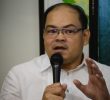MANILA — Palace spokesman Ignacio Bunye on Wednesday called for the people to move on so that the government could push economic reforms, reiterating Malaca�ang�s claims that President Gloria Macapagal-Arroyo had decisively won 2004 national elections. But it is precisely her economic �reforms,� such as the reformed value-added tax (RVAT) law, that continue to contribute to political unrest, and not only allegations of corruption and election fraud, according to independent think-tank Ibon Foundation.
�Life has inarguably become more difficult for the people under Arroyo,� says Ibon research head Sonny Africa. Ibon�s estimated cost of living (national average) has grown almost 30% during the more than five years of the Arroyo administration. The real value of the peso has fallen by 23% during the same period.
While prices of basic goods and services have been increasing because of high oil prices and successive fuel price hikes, the Arroyo administration has failed to moderate the effects of these high pump prices. Prices of petroleum products rose drastically in 2005 and increased by some 30% from year end-2004 levels. This brought pump prices to more than double the average price in 2001, the first year of the Arroyo administration, and over four times the level in 1996 upon oil industry deregulation.
High fuel prices, coupled with the increase in the basic VAT rate from 10% to 12% under the RVAT law helped push the prices of basic goods and services upward by 7.6% in February. Arroyo has also refused to implement price controls to help over-burdened Filipinos cope with high prices.
Government�s liberalization policies, such as privatization of the electricity sector and government�s refusal to take over the privatized water concession in Metro Manila, have also resulted in successive water and electricity rate hikes that have soared prices and strained consumers� budgets.
According to Africa, the underlying economic crisis has contributed to further unrest among the people and has led further to Arroyo�s declining popularity. Malaca�ang should not blame the current �political noise� on the opposition, but should realize that this crisis is brought about by allegations of corruption, charges of election fraud, and political unrest resulting from the economic crisis, says Africa. (Ibon)










